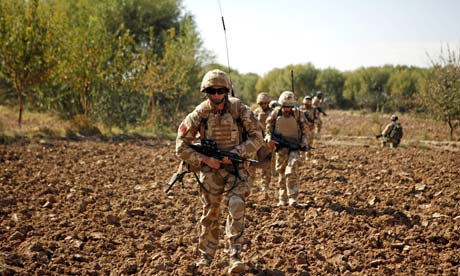UK soldier killed in Afghanistan
Soldier from Scottish regiment becomes first British military fatality of 2011 after being caught in explosion in Afghanistan

A soldier from the Argyll and Sutherland Highlanders, 5th Battalion The Royal Regiment of Scotland, has become the first British military fatality of 2011 after being struck by a roadside explosion in southernAfghanistan.
He was killed on New Year's Day in Nahr-e Saraj, according to the Ministry of Defence. Next of kin have been informed, but he has not yet been named.
In a statement, the MoD said: "The soldier was killed when he was caught in an explosion while deployed on an operation to interdict enemy fighters and bring peace to the district of Nahr-e Saraj."
A spokesman for Task Force Helmand, Lieutenant Colonel David Eastman, added: "He was part of an operation aiming to bring peace and prosperity to the people of a former insurgent haven, and has made the ultimate sacrifice in seeking a better life for others. He will remain in our thoughts and our deepest condolences go out to his family and friends."
The last British fatality of 2010 was of Warrant Officer Class 2 Charles Wood from 23 Pioneer Regiment RLC (Royal Logistic Corps), who was killed in Afghanistan on 28 December while helping clear improvised explosive devices.
More than a hundred UK servicemen have died in Afghanistan in each of the past two years. A total of 349 British soliders have been killed since operations began there in 2001. Nearly 2,300 members of the Nato-led force have perished over the same period. Of those, 1,444 were Americans. After the UK, Canada has suffered the most casualties with 154 killed. France has had 51 fatalities and Germany 45.
Military and civilian casualties are at record levels, with 711 foreign troops killed in 2010, by far the bloodiest year of the war so far. Attacks have spread out of Taliban strongholds in the south and east of the country into formerly peaceful areas further north.
Afghanistan's deputy counternarcotics minister, Mohammad Ibrahim Azhar, warned today that opium prices had almost doubled, raising fears that more farmers are turning to the illicit crop in the absence of profitable alternatives. The Taliban are alleged to earn as much as $400m (£256m) a year in revenues levied from drug production and trafficking, according to UN data.
Inga kommentarer:
Skicka en kommentar